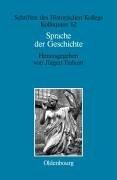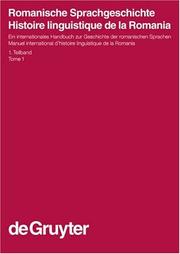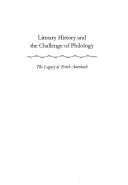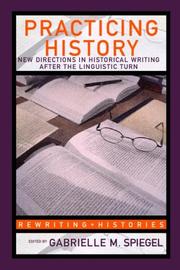| Listing 1 - 7 of 7 |
Sort by
|

ISBN: 3486575724 9783486575729 9783486594638 348659463X Year: 2005 Publisher: München Oldenbourg
Abstract | Keywords | Export | Availability | Bookmark
 Loading...
Loading...Choose an application
- Reference Manager
- EndNote
- RefWorks (Direct export to RefWorks)
In einer interdisziplinären Debatte stellen sich Philosophen, Sprachwissenschaftler und Historiker dem ";linguistic turn"; und diskutieren das Verhältnis von Sprache und Geschichte noch einmal grundsätzlich. Das Ergebnis ist ein wichtiger Beitrag nicht nur zur Geschichtswissenschaft, sondern zur Meta-Geschichte - bis hin zur Forderung nach einem ";historical turn"; der Linguistik.
Language and history --- History --- History and language --- Linguistics and history --- Philosophy --- History of philosophy --- Linguistics --- History as a science
Book
ISBN: 9789027248459 9027248451 130607343X 9027271194 9789027271198 9781306073431 Year: 2013 Publisher: Amsterdam John Benjamins Publishing Company
Abstract | Keywords | Export | Availability | Bookmark
 Loading...
Loading...Choose an application
- Reference Manager
- EndNote
- RefWorks (Direct export to RefWorks)
This volume of selected papers from the 20th International Conference on Historical Linguistics (Osaka, Japan, July 2011) presents a set of stimulating and ground-breaking studies on a wide range of languages and language families. As the scope of studies that can be characterized as ‘Historical Linguistics’ has expanded, ICHL conferences have likewise seen a broadening of topics presented, and this conference was no exception, reflected by the inclusion in this volume of a plenary presentation on the grammaticalization of expressions of negation and gendered kinship in American Sign Language. Three other papers propose new views of the role of grammaticalization in English, Chinese, and Niger-Congo languages. Four of the papers discuss specific problems that arise in the comparison and reconstruction of linguistic features in a range of languages from Asia, Europe and South America. The last six studies deal with innovative approaches to the historical development of suppletion in Romance languages, possessive classifiers in Austronesian, universal quantifiers in Germanic, adjectival sequences in English, exaptation in Celtic and Early English, and drift in Ancient Egyptian.
Historical linguistics --- Linguistique historique --- Congresses. --- Congrès --- Language and history --- History and language --- Linguistics and history --- History --- E-books --- Conferences - Meetings

ISBN: 9053563067 9786611972257 1281972258 9048503558 9789048503551 9781281972255 9789053563069 9790000000000 Year: 1998 Publisher: Amsterdam : Amsterdam University Press,
Abstract | Keywords | Export | Availability | Bookmark
 Loading...
Loading...Choose an application
- Reference Manager
- EndNote
- RefWorks (Direct export to RefWorks)
First introduction to an english-speaking audience of a field of research booming in continental Europe.
Concepts --- Historiography --- History --- Language and history --- History and language --- Linguistics and history --- Historical criticism --- Authorship --- Concept formation --- Abstraction --- Knowledge, Theory of --- Perception --- Psychology --- Methodology --- Criticism --- Concepts. --- Historiography. --- Language and history. --- Methodology. --- Social history --- World politics --- History. --- Colonialism --- Global politics --- International politics --- Political history --- Political science --- World history --- Eastern question --- Geopolitics --- International organization --- International relations

ISBN: 3110146940 9783110171501 9783110171518 3110171503 3110171511 3110187582 9786612193439 1282193430 3110194120 9786613428868 1283428865 3110211416 9786612194887 1282194887 3110199831 9783110146943 9783110199833 Year: 2003 Volume: 23 Publisher: Berlin De Gruyter
Abstract | Keywords | Export | Availability | Bookmark
 Loading...
Loading...Choose an application
- Reference Manager
- EndNote
- RefWorks (Direct export to RefWorks)
This series of HANDBOOKS OF LINGUISTICS AND COMMUNICATION SCIENCE is designed to illuminate a field which not only includes general linguistics and the study of linguistics as applied to specific languages, but also covers those more recent areas which have developed from the increasing body of research into the manifold forms of communicative action and interaction.For ""classic"" linguistics there appears to be a need for a review of the state of the art which will provide a reference base for the rapid advances in research undertaken from a variety of theoretical standpoints, while in the m
History --- Romance languages --- Langues romanes --- History. --- Study and teaching. --- Histoire --- Etude et enseignement --- Historical linguistics. --- Latin language --- Handbooks, manuals, etc. --- Diachronic linguistics --- Dynamic linguistics --- Evolutionary linguistics --- Language and languages --- Language and history --- Linguistics --- Historial linguistics. --- Language and history. --- History and language --- Linguistics and history --- Romance studies. --- llanguage history. --- Language History. --- Romanistik.

ISBN: 0804725454 Year: 1996 Publisher: Stanford, Calif. Stanford University Press
Abstract | Keywords | Export | Availability | Bookmark
 Loading...
Loading...Choose an application
- Reference Manager
- EndNote
- RefWorks (Direct export to RefWorks)
Literature --- Auerbach, Erich --- 82 --- Language and history --- -Literature and history --- Philology --- History and literature --- History and poetry --- Poetry and history --- History --- Belles-lettres --- Western literature (Western countries) --- World literature --- Authors --- Authorship --- History and language --- Linguistics and history --- Literatuur. Algemene literatuurwetenschap --- History and criticism --- -Theory, etc --- Language and history. --- Literature and history. --- Philology. --- Theory, etc. --- 82 Literatuur. Algemene literatuurwetenschap --- Literature and history --- History and criticism&delete& --- Theory, etc --- Auerbach, Erich, --- Oʼerbakh, Erikh, --- אוארבך, אריך --- אוארבך, אריך, --- 82 Literature in general --- Literature in general --- Literature History and criticism --- Auerbach (erich), 1892-1957 --- Philologie --- Litterature --- Litterature et histoire --- Langage et histoire --- Histoire et critique --- Theorie, etc.

ISBN: 0415341086 0415341078 9780415341080 9780415341073 9780203335697 9781134296798 9781134296835 9781134296842 Year: 2005 Volume: *14 Publisher: New York, N.Y. Routledge
Abstract | Keywords | Export | Availability | Bookmark
 Loading...
Loading...Choose an application
- Reference Manager
- EndNote
- RefWorks (Direct export to RefWorks)
"Gabrielle Spiegel presents an essential new collection of key articles that examine the current status of the debate over the 'linguistic turn', and attempt to rethink the practice of history in light of its implications. These are writings that operate within the framework of the linguistic turn, yet seek to move beyond its initial formulation and reception. The volume offers a synoptic overview of the last twenty-five years of theoretical analysis of historical writing, with a critical examination of the key concepts and positions that have been in debate. This collection delineates the emergence of a new 'practice theory' as a possible paradigm for future historical interpretation concerned with questions of agency, experience and the subject. Articles drawn from a mix of critical thinkers and practicing historians are drawn together along with clear and thorough editorial material. Complex ideas at the forefront of historical practice are revealed and made accessible to students, while for their teachers and other historians this new survey is an indispensable and timely read"--Provided by publisher.
History as a science --- Criticism [Historical ] --- Critique historique --- Geschiedkundige methodologie --- Geschiedschrijving --- Geschiedschrijving--Methodologie --- Historical criticism --- Historical method --- Historical methodology --- Historiografie --- Historiographie --- Historiography --- Historische kritiek --- Historische methode --- Historische methodologie --- History--Criticism --- Kritiek [Historische ] --- Language and history --- Language et histoire --- Methodologie [Historische ] --- Methodology [Historical ] --- Taal en geschiedenis --- Historiography. --- Language and history. --- Writing --- Langage et histoire --- Ecriture --- History. --- Histoire --- 930.2 --- Methoden en technieken van de geschiedwetenschap --- Geschiedenis van opvoeding en onderwijs --- handboeken en inleidingen --- handboeken en inleidingen. --- 930.2 Methoden en technieken van de geschiedwetenschap --- Hieroglyphics --- History and language --- Linguistics and history --- History --- Authorship --- Criticism
Multi
ISBN: 9780748635986 074863598X 9780748635993 0748635998 128274965X 9781282749658 9780748671472 0748671471 9786612749650 6612749652 Year: 2010 Publisher: Edinburgh Edinburgh University Press
Abstract | Keywords | Export | Availability | Bookmark
 Loading...
Loading...Choose an application
- Reference Manager
- EndNote
- RefWorks (Direct export to RefWorks)
This book explores the dynamics of language and social change in central Europe in the context of the end of the Cold War and eastern expansion of the European Union. One outcome of the profound social transformations in central Europe since the Second World War has been the reshaping of the relationship between particular languages and linguistic varieties, especially between 'national' languages and regional or ethnic minority languages. Previous studies have investigated these transformed relationships from the macro perspective of language policies, while others have taken more fine-grained approaches to individual experiences with language. Combining these two perspectives for the first time--and focusing on the German language, which has a uniquely complex and problematic history in the region--the authors offer an understanding of the complex constellation of language politics in central Europe. Stevenson and Carl's analysis draws on a range of theoretical, conceptual and analytical approaches - language ideologies, language policy, positioning theory, discourse analysis, narrative analysis and life histories - and a wide range of data sources, from European and national language policies to individual language biographies. The authors demonstrate how the relationship between German and other languages has played a crucial role in the politics of language and processes of identity formation in the recent history of central Europe.
Social change --- Sociolinguistics --- Language and languages --- Language policy --- German language --- Political aspects. --- Political aspects --- History. --- Eastern and Central Europe --- Language and history --- History and language --- Linguistics and history --- History --- Ashkenazic German language --- Hochdeutsch --- Judaeo-German language (German) --- Judendeutsch language --- Judeo-German language (German) --- Jüdisch-Deutsch language --- Jüdischdeutsch language --- Germanic languages --- Glottopolitics --- Institutional linguistics --- Language and state --- Languages, National --- Languages, Official --- National languages --- Official languages --- State and language --- Communication policy --- Language planning --- Change, Social --- Cultural change --- Cultural transformation --- Societal change --- Socio-cultural change --- Social history --- Social evolution --- Language and society --- Society and language --- Sociology of language --- Language and culture --- Linguistics --- Sociology --- Integrational linguistics (Oxford school) --- Government policy --- Social aspects --- Sociological aspects --- Language and languages Political aspects
| Listing 1 - 7 of 7 |
Sort by
|

 Search
Search Feedback
Feedback About UniCat
About UniCat  Help
Help News
News